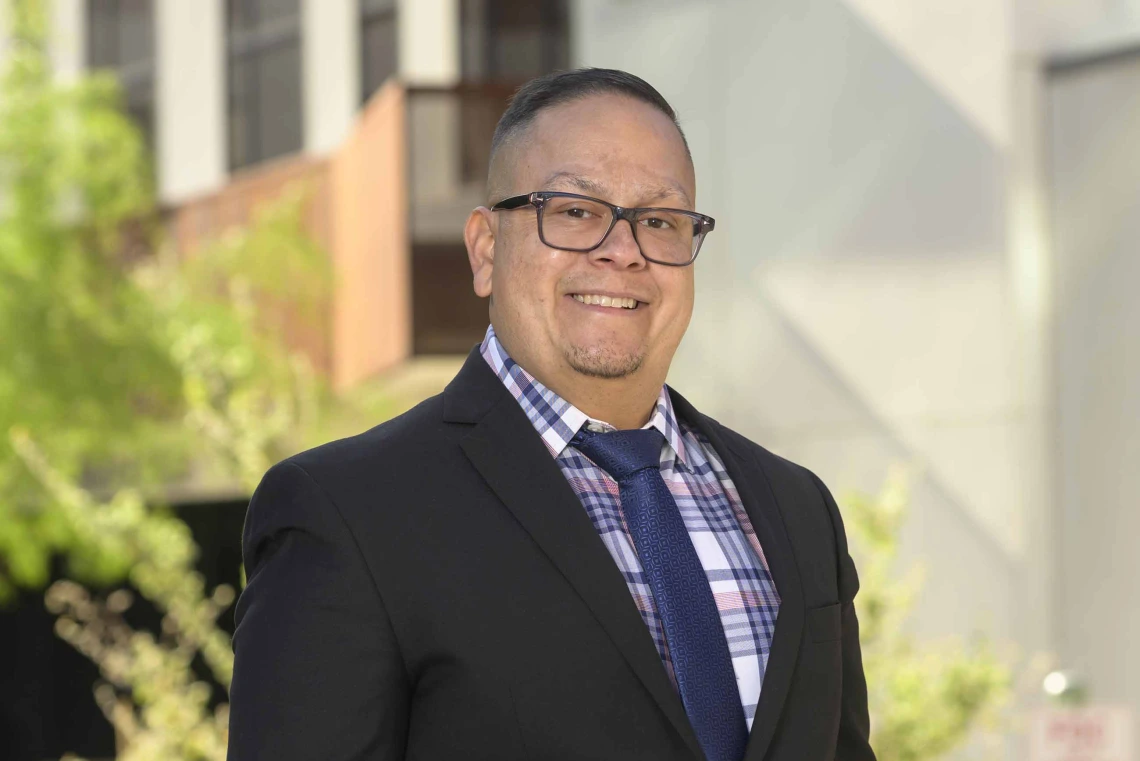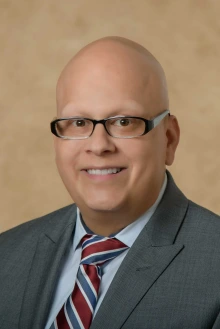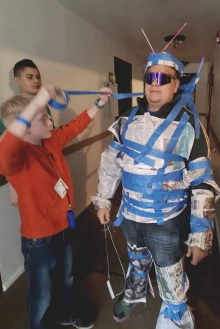Alejandro Vazquez lets his lived experience do the teaching
Pharmacy professor shares personal health struggles to teach his students empathy.

Alejandro Vazquez, PharmD, incorporates his own experiences with allergy, asthma and alopecia when teaching his classes.
Photo by Kris Hanning, U of A Health Sciences Office of Communications
Alejandro Vazquez, PharmD, was a sickly kid.
He suffered from asthma and allergies that were so debilitating he was in and out of the hospital.
Daily medications were a fact of life, much to his dismay. While he hated being sickly, that experience provided a foundation for his adulthood mission.

Alejandro Vazquez, PharmD, was diagnosed wtih alopecia while he was a high school student. This portrait was taken when he was hired at the U of A in 2020.
Photo courtesy of Alejandro Vazquez
“I was a pretty tough, stubborn kid,” said Vazquez, an assistant clinical professor in the Pharmacy Practice and Science Department at the University of Arizona R. Ken Coit College of Pharmacy. “I did not like taking medicine.”
His parents tried to trick him by hiding them in food.
“They’d treat me like a puppy and wrap the pill up in something,” Vazquez said.
That didn’t work.
In high school, he was diagnosed with alopecia. Vazquez’s medication regimen amped up to a revolving carousel of topical creams, trial drugs and, at one point, painful injections. It was rough, but, as a result, Vazquez is an empathetic pharmacist who understands what it’s like to be on the other side of the counter.
“I am thankful for the experience that I have had,” Vazquez said. “I think it’s helped me become a better practitioner.”
Life lessons
Tufts of hair started falling out when Vazquez was in high school. By the time he was in his early 20s, his hair was patchy but he still had some. Vazquez made it through college and pharmacy school without any issues. Then all his hair fell out.
“My students, bless their hearts, were so worried. Every once in a while, I’d have one in my office asking if I was dying or had cancer,” said Vazquez, who jokes that he lost all his hair the same year he got engaged and married his wife, Jessie.
“My wife doesn’t like this joke,” he laughed. “She’s definitely not the cause.”
After participating in clinical trials for drugs that did nothing for his baldness, Vazquez heard about the FDA’s approval of Olumiant, the first drug approved for alopecia. As is true of most new medications, Olumiant was initially cost-prohibitive. Vazquez hunted around for a discount program and had to show his insurance company that he’d exhausted all options.
He started the drug in 2022 and, six months later, started seeing fresh hair growth.
Today, Vazquez sports jet-black hair cut in a fade – vastly different from the photo snapped when he joined the U of A in 2020, when his face and head were completely hairless.
Vazquez is not shy about sharing his experiences with his classes. He teaches PhPr 816a – Physical Assessment and PhPr 860e – Pharmacotherapeutics 5 and shares a series of slides that track the disease’s progression over the years. It’s an important lesson in empathy.
“Even with all my knowledge and all of my abilities and skills and pharmaceutical background and knowledge of insurance and prior authorizations, it was an uphill battle for me,” Vazquez said. “I always remind my students that if you did something and it was hard for you, imagine how hard it is going to be for your patient who has none of this training and does not speak the medical lingo.”
Showing students the patient behind the medication
Vazquez practices ambulatory care with Phoenix Children’s Hospital, in allergy, immunology, asthma and endocrinology, where he is in the process of developing pharmacy clinical practice so students gain clinical experience while on rotation.

Because of his childhood history, Alejandro Vazquez, PharmD, says he was able to connect well with his young charges at a recent summer camp for kids with chronic lung issues or asthma.
Photo courtesy of Alejandro Vazquez
With his easy-going manner, Vazquez is one of those who can strike up a conversation with a stranger and instantly make a new friend. Those people skills come in handy when it comes to talking to patients about their fears about vaccine or medication side effects.
“When you need an inhaler for asthma, for example, it can be scary because of some of those side effects listed on the box. But I’ll always say, ‘Let me tell you about my experience and talk to you a little bit about why these are safe long term,’” Vazquez said. “I’ve incorporated that into my teaching style and with patient education.”
This summer, Vazquez brought a few fourth-year pharmacy students to Camp Not-A-Wheeze in Prescott, Arizona, for kids 7-14 years old with chronic lung disease or allergic conditions, as well as their siblings. It was a first for him and his students. As a youngster Vazquez went to a regular summer Boy Scout camp.
“I think being asthmatic and having allergies helped me connect better with my campers,” he said.
Vazquez’s pharmacy students were saddled with a lot of responsibility, from managing all medications and daily dosages to emergency situations. Since camp was just seven days, they learned fast.
“What I really loved about camp was seeing my students grow over the week. In the beginning, they were timid, made mistakes and had trouble managing the cabin,” Vazquez said. “As the week went on, they became more competent and capable, taking charge of all camper medications and even making recommendations.”
The lesson Vazquez works hardest to instill is to treat everyone with humanity and humility.
“The biggest lesson from my experience is to not assume you know the history of the person in front of you,” he said. “Over the years, there were many assumptions about my condition – I have mange. I’m not clean. I have cancer. – that affected how people treated me. We live in a society where so much is assumed by what is presented to the world, we forget that each human experience is unique, and in the end, that person only wants to be seen as who they are.”

